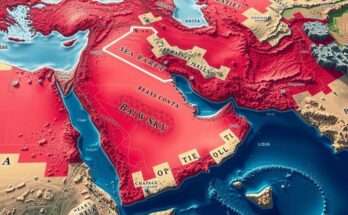Saudi Arabia, UAE, and Qatar are lobbying Washington to prevent Israel from targeting Iranian oil facilities amidst fears of escalating tensions. Iran is seeking support from Gulf nations to de-escalate the situation, with all three nations refusing Israel airspace to mitigate risks to their oil infrastructure. Experts warn that any military conflict could disrupt global energy supplies and significantly impact the economy.
Recent developments indicate that Saudi Arabia, the United Arab Emirates (UAE), and Qatar are actively lobbying Washington to counter Israel’s potential military actions against Iran. This concern arises amid heightened tensions as Iranian Foreign Minister Abbas Araghchi seeks support from Gulf nations to de-escalate the situation. Concerns are prevalent that an Israeli strike could specifically target Iranian oil facilities, thereby affecting Gulf assets and jeopardizing regional stability. The three Gulf states have explicitly denied Israel permission to utilize their airspace for any military operations. Reports suggest that Iran has issued a warning regarding the safety of the Kingdom’s oil facilities should Israel proceed with its plans. Furthermore, recent Israeli declarations have hinted at forthcoming attacks targeting Iranian military installations, which could have dire implications for international energy supplies. Experts emphasize that significant interruptions in oil and gas exports could severely impact the global economy.
The geopolitical landscape of the Gulf region remains fraught with tension as various states navigate complex relationships affected by external pressures and internal dynamics. The looming threat of conflict between Israel and Iran raises critical concerns about the stability of oil supplies from the Gulf, a pivotal component of the global economy. Recent discussions among Gulf Cooperation Council (GCC) members reflect anxieties regarding the ramifications of a potential military confrontation. Understanding these dynamics is crucial for analyzing the broader implications for energy markets and international relations.
In conclusion, the collective efforts of Saudi Arabia, UAE, and Qatar to coordinate with the United States underscore the urgency of addressing the potential military escalation involving Israel and Iran. With Iranian officials warning against the opening of airspace to Israel and Israel signaling imminent military action, the situation remains precarious. The potential disruption of oil supplies poses considerable risks, necessitating a careful diplomatic approach to mitigate conflict and protect Gulf resources.
Original Source: oilprice.com




